MSCA Correspondence Analysis: from individual mobility to leading networks and programmes
27/01/2026

The satisfactory use of the possibilities for coordination of projects aimed at reducing the persistent gaps in research and innovation performance (widening projects), the relative success in gaining ERC grants, and the higher success in coordinating larger-scale research and innovation projects (RIA and IA projects) are the key factors that distinguish the Czech Republic from most other widening countries in the HE programme, and, on the contrary, bring it closer to countries with higher research and innovation potential.
The project coordination is becoming a key aspect of the Czech participation in the FPs. While in FP7 Czech research teams and individual researchers participated in FP projects rather as members of research consortia or as coordinators of individually oriented projects, the end of the H2020 programme and especially the current situation of the HE programme show that the situation is gradually changing and Czech research institutions are also becoming more involved in leading larger consortium projects. The question remains whether this is really the beginning of a new and permanent trend in the thinking and perception of the FPs as an ideal tool to promote own research and ideas, supported by improving management and coordination capacities and skills in research institutions and the development of consultancy and stimulation tools for project coordinators, or whether it is just a combination of extremely positive circumstances and the immeasurable efforts of extremely agile individuals and research teams.
Although the proportion of coordinated FP projects in the Czech Republic is gradually approaching that of developed EU countries, there is still a need for more FP projects led by Czech institutions and individuals. Although the Czech Republic is gradually reducing its deficit from previous FPs in the number of coordinators in relation to its research capacity, it is still lagging behind the developed EU countries and some of the widening countries. There is no doubt that the coordination of FP projects offers considerable potential for a more successful future of the Czech Republic in the FP. The higher the number of the FP projects under the leadership of Czech coordinators, the higher the participation of the Czech Republic in the FP. The calling for increased participation of the Czech Republic in the FP should therefore not be abandoned. In the Czech Republic, we should not completely stop mass events for new applicants for participation in the FP, but at the same time it is necessary that the activities of all responsible actors in the Czech research area should be targeted and intensively directed towards supporting really perspective individuals and research teams.
Daniel Frank, TC Prague, January 28, 2024
Taking the leadership role in an EU FP project is not an easy task for a research organisation or an individual. It is true that coordinating such a project involves responsibility for its preparation, management, achieving the set objectives and delivering the expected outputs of the project. Particularly in the context of consortium projects based on the cooperation of many partners from many countries, it is often mentioned that the coordination of a research project brings with it an additional administrative burden and offers little benefit to the coordinating actor. For these reasons, some research bodies prefer to participate in FP projects only as members of a research consortium without the ambition to manage and lead such a project.
On the other hand, the experience of many project coordinators suggests that project leadership can bring significantly more benefits to coordinators than serving as an ordinary member of a research consortium. Among the benefits of project coordination is undoubtedly the prestige that the coordinating body naturally gains. Usually, the coordinator's workplace or his/her team is improved. In the preparation and implementation of a project, the coordinator, as captain, can steer the research ship in a direction that makes sense through his proactive efforts and can more easily promote his own research directions and his own research vision.
The economic dimension of the problem cannot be overlooked. Project coordinators play a key role in the creation of research consortia, taking on a much larger part of the workload and thus the project budget. For this reason, it is not uncommon in consortium projects for coordinators to receive a third (and sometimes more) of the total project budget.
It is a well-known fact that project coordinators join other research institutions and partners from their countries in the research consortium. According to my own calculations, a project led by a coordinator from a given country has a much higher proportion of national partners from that country than a project led by a coordinator from another country. In relation to the Czech Republic - if the FP project is managed by a Czech coordinator, there will most likely be more Czech participants in the research consortium than if the project was coordinated by a coordinator from another country. In this way, coordinators increase the participation of their country in the FP. The more project coordinators a country has, the higher its participation in the FP. In countries where there are more project coordinators and thus more other national partners in projects, research networks tend to grow and research excellence increases.
In the context of the above considerations, the analysis shows that the share of project coordinators from the Czech Republic in the FPs is increasing over time. This can be deduced from the data presented in Tables 1 and 2. Table 1 shows for 32 countries and for three FPs (FP7, H2020, HE) the shares of the number of project coordinators from a given country in relation to the total number of project coordinators in the countries monitored, and similarly the shares of financial contribution allocated to project coordinators from a given country in relation to the total contribution requested by project coordinators from all countries monitored. In the case of the Czech Republic, the share of the number of Czech project coordinators in relation to the total number of coordinators in 32 countries was 0.66% in FP7, 0.80% in the H2020 programme and 1.54% in the HE programme so far. In the case of the shares of the financial contribution for the project coordinators from the Czech Republic to the total financial contribution for all project coordinators from the European countries, the following shares are observed: FP7 - 0.43%, H2020 - 0.70% and HE - 1.25%. According to the increases in these shares, it can be concluded that the significance of project coordinators for the participation of the Czech Republic in the FP is increasing over time.
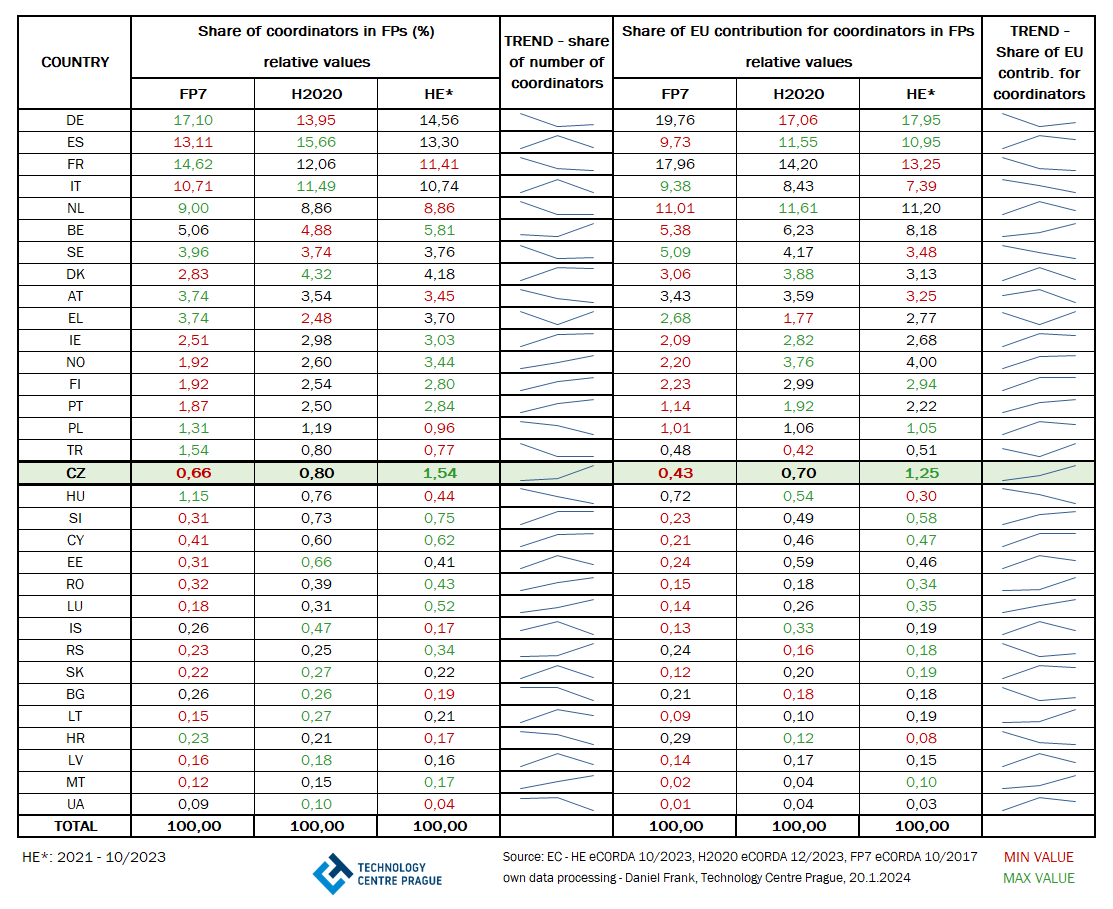
Table 1: The shares of the number of project coordinators from a given country to the total number of project coordinators in the monitored countries and the shares of financial contribution for project coordinators from a given country to the total support requested by project coordinators from all monitored countries in FP7, H2020 and HE.
Another alternative to assess the trend of project coordination in individual European countries is to calculate the number of project coordinators per 1 000 FTE researchers in each FPs. The values obtained, respectively the number of coordinators per 1 000 FTE researchers in a given FP, can then be grouped according to the values of the relevant quartiles. In the case of the Czech Republic, it can be seen that in FP7 and H2020 the number of coordinators per 1,000 FTE belonged to the first quartile, while in the HE programme the value of the number of coordinators per 1,000 FTE in the Czech Republic moved to the second quartile. This means that the Czech Republic has improved its position compared to other countries in the HE programme. When considering the ranking of countries, the Czech Republic ranked 21st among the 28 countries monitored in this indicator in FP7 and H2020. In the HE programme, the Czech Republic ranks 17th, where it is outperformed in the number of coordinators per 1,000 FTE by five countries - Greece, Estonia, Slovenia, Portugal and Latvia. By comparison, in FP7 the Czech Republic was outperformed by eight widening countries - Greece, Estonia, Portugal, Hungary, Latvia, Slovenia, Croatia and Bulgaria, and in H2020 by seven widening countries - Estonia, Slovenia, Greece, Portugal, Latvia, Croatia and Romania. However, Estonia, Bulgaria, Croatia and Romania, which outperformed the Czech Republic in the number of coordinators per 1000 FTE researchers in at least one FP, have project coordination based mainly on the management of projects funded by the calls of the specific priorities Widening Participation and Spreading Excellence - SEWP in H2020 and HE or Regional Potential - REGPOT in FP7.
In order to compare the position of the values obtained for the number of coordinators per 1 000 FTE researchers across all FPs, it is useful to transform these values into a so-called standard score (z-score). Standard scores are used when it is desirable to clearly express the position of individual values relative to the whole population, or to compare results from two or more datasets on different scales that have different means and variances. Transforming the absolute numbers of coordinators per 1 000 FTE researchers into z-scores, it can be seen that the z-score is the highest in the HE programme in the case of the Czech Republic. This means that the Czech Republic is the closest to the average value of this indicator (number of coordinators per 1 000 FTE) of all countries monitored in the HE programme. This also indicates an improvement in the position of the Czech Republic among the countries assessed in the HE programme.
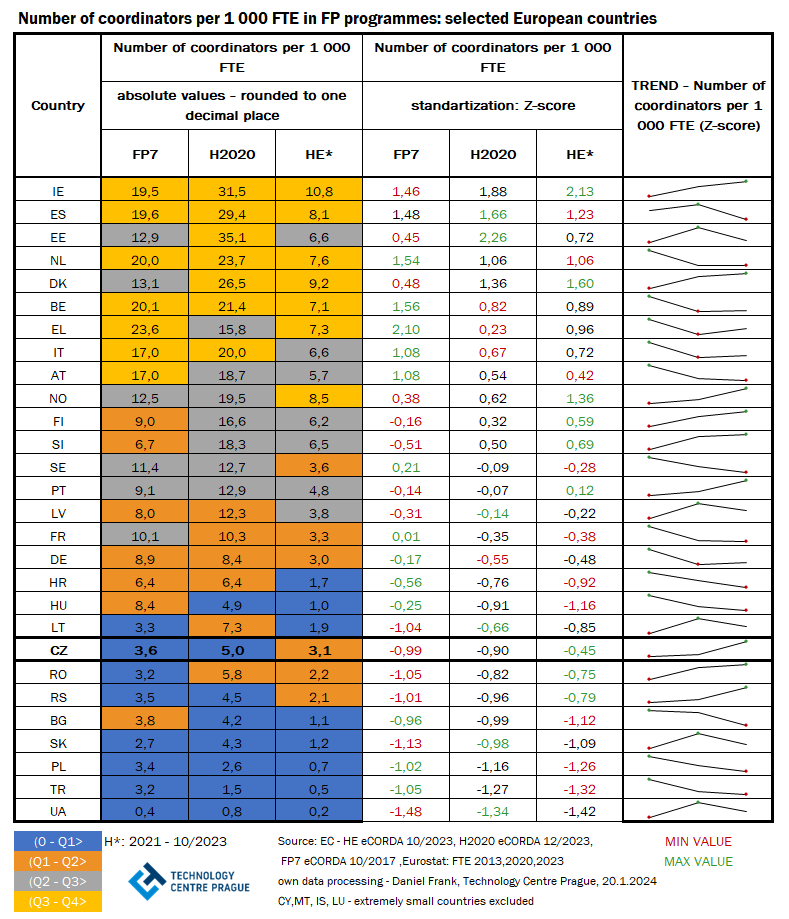
Table 2: Number of coordinators from FP7, H2020 an HE in selected European countries per 1,000 FTE researchers and standardised by z-score
Another way to analyse the significance of project coordinators for participation in the FPs is to look at the evolution of the share of coordinators in relation to the total number of participations in FP projects - see Figure 1a. This share can be understood as the intensity of coordination of FP projects. At a first glance, it is clear that in the case of the Czech Republic the share of the number of project coordinators from the Czech Republic in relation to the total number of participations from the Czech Republic is increasing over time. This indicates that the intensity or capacity to coordinate FP projects is improving in the case of the Czech Republic from FP7 to the HE programme so far. In FP7, the share of Czech project coordinators in the total number of participations from the Czech Republic was only 9%, in H2020 it was already almost 14% and in the HE programme almost 19%. While in FP7 the Czech Republic was ranked 25th among the 32 countries assessed, in H2020 it was ranked 22nd and in the HE programme so far it has risen to 9th place among all countries evaluated.
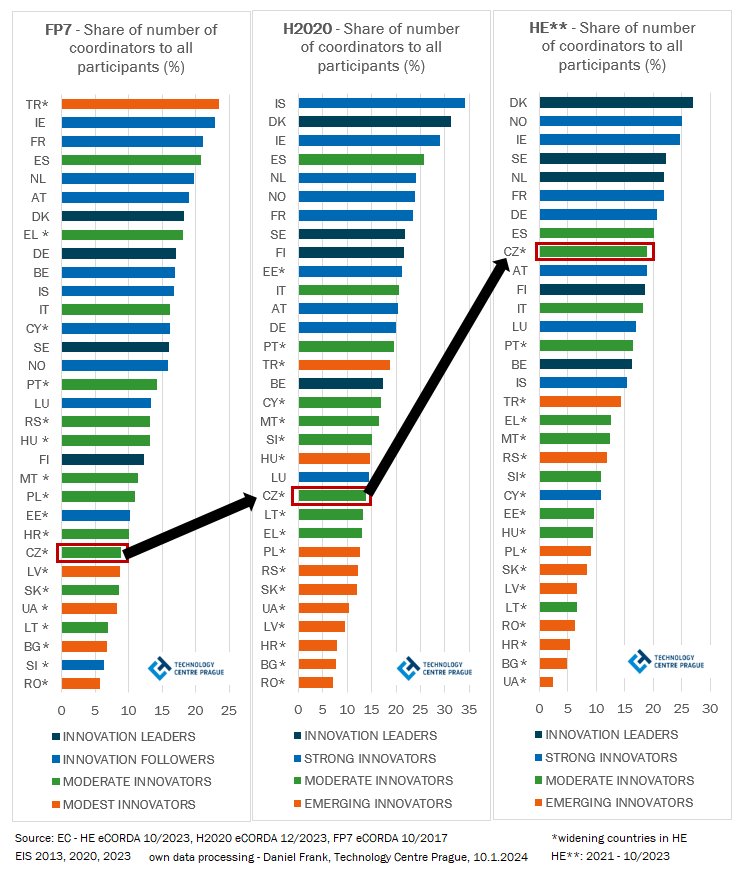
Figure 1a: Share of the number of coordinators in relation to the total number of participations in selected European countries in the three FPs- FP7, H2020 and HE
The key issue for the evaluation of participation in the FPs is always the financial contribution received or requested. For this reason, we will also determine the share of financial contribution for the project coordinators in the selected European countries in the three following FPs. Again in the case of the Czech Republic, we can confirm a positive trend of increasing capacity and intensity to coordinate FP projects. In FP7, the share of financial contribution requested by the Czech coordinators to the total financial contribution for the Czech Republic from this FP was about 19%, in the H2020 programme this share increased to more than 32% and in the HE programme it climbed up to 43%. The position of the Czech Republic among the other countries is also important - in FP7 the Czech Republic was ranked 28th among all countries in this indicator, in H2020 it moved up to 20th place and in the HE programme it is ranked 8th among all 32 evaluated countries. This is really a significant progress.
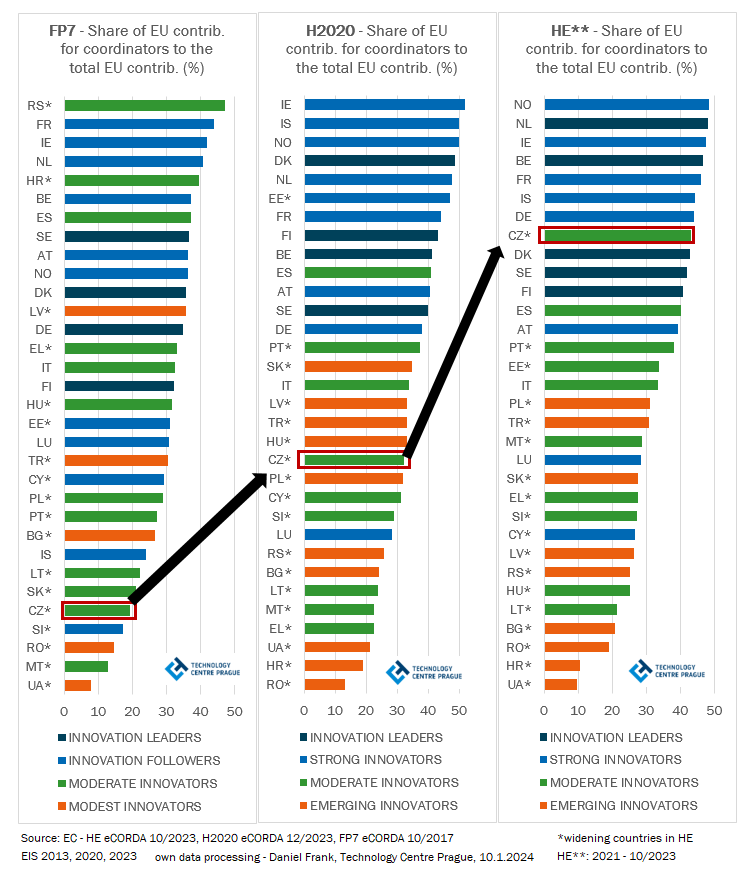
Figure 1b: Share of the financial contribution for project coordinators in selected European countries in relation to the total financial contribution requested in each country in the three consecutive FPs - FP7, H2020 and HE
It can be seen from the previous two figures as well as from Figures 2a and 2b below that the share of the number of coordinators in relation to the total number of pparticipations (or the share of financial contribution for coordinators in relation to the total financial contribution for all project participations) is generally higher in those countries categorised as innovation leaders or strong innovators by the European Innovation Scoreboard (EIS). This means that there is a relatively strong correlation between the shares of the number of coordinators or the shares of financial contributions requested for coordinators and the Summary Innovation Index (SII) presented by the EIS. In the case of the Czech Republic, it is important that since FP7 the Czech Republic is gradually moving closer to the positions occupied by the advanced European countries. Not only is the Summary Innovation Index (SII) presented by the EIS for the Czech Republic increasing, but also its share of financial contribution to coordinators is increasing, i.e. its intensity and capacity to coordinate FP projects is increasing. The Czech Republic is approaching the innovation and research developed countries in terms of the intensity of coordination of HE programme projects and is moving away from most of the so-called widening countries. In the course of the HE programme so far, the Czech Republic has a comparable ratio of the number of coordinators to the total number of participations with Austria, Finland and Italy. Compared to the Czech Republic, Poland and Hungary have about half the share of coordinators in the HE programme. Czech coordinators contribute a comparable share of financial support to the national financial balance as coordinators from Germany, Denmark, Sweden and Finland.
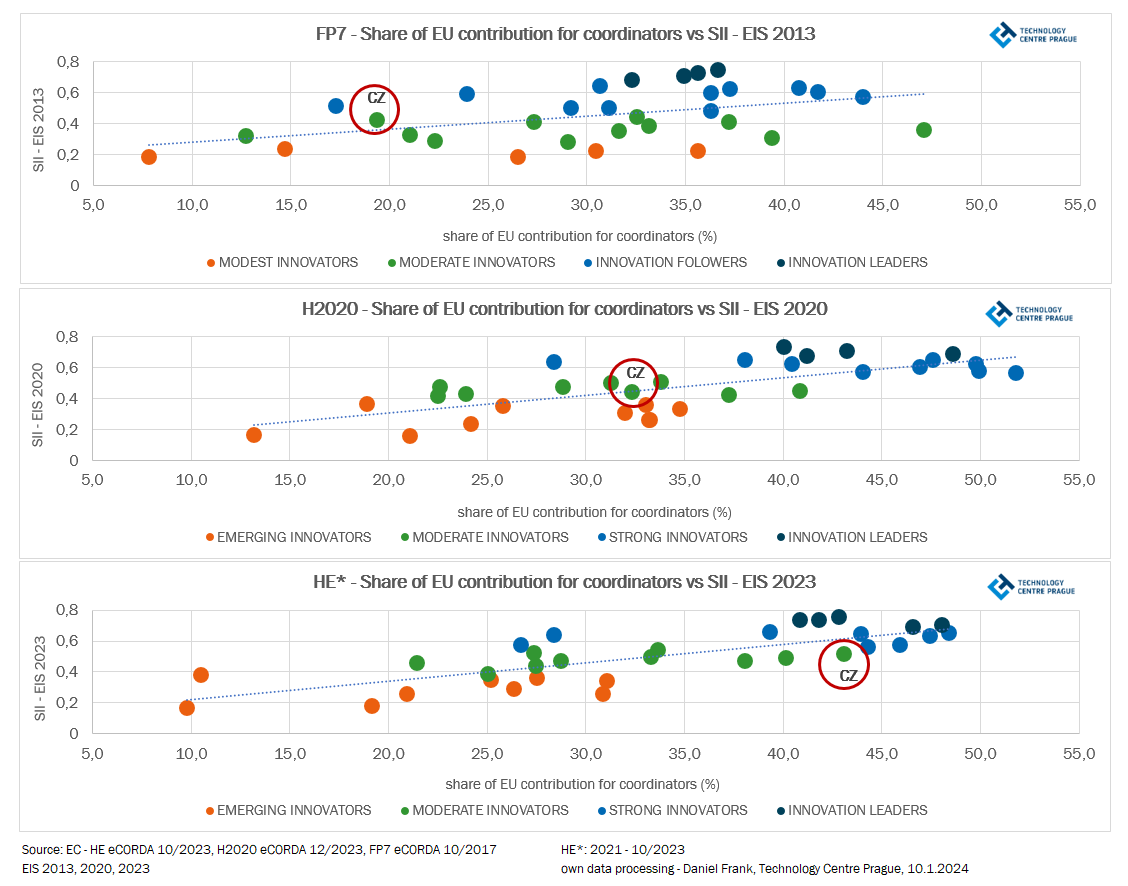
Figure 2a - Relationship between the Summary Innovation Index and the share of financial contribution for coordinators from selected European countries divided according to their innovation performance in the three FPs - FP7, H2020 and HE
The New Member States (NMS - EU13), including the Czech Republic and other countries with lower innovation and research potential, the so-called widening countries, can participate as coordinators of a specific priority of the Higher Education Programme to reduce the persistent gap in research and innovation performance - Widening Participation and Spreading Excellence (SEWP). Similarly, in the H2020 programme, there was an almost identical priority for the above purposes, with a similar title of Spreading Excellence and Widening Participation (SEWP). In FP7, there was a Regions of Knowledge (REGPOT) priority for less developed EU regions, which included mainly widening countries. This priority was aimed at developing the research and technological capacities of selected research institutions from the less developed - convergence regions of the EU and their cooperation with centres of excellence in the EU. These priorities, with their territorial preference for less developed countries, obviously had and have a positive impact on their participation in the FP and their ability to coordinate FP projects, as research and innovation strong countries could not and usually cannot coordinate projects funded by these priorities. For this reason, the sizes of the shares of coordinators to total FP participation and the shares of financial contribution for coordinators to total financial contribution for all participations in FP projects, as presented in the above analytical and graphical outputs, are positively affected for the so-called widening countries. Hypothetically, if we exclude the REGPOT priority in FP7 and the SEWP priority in H2020 and HE (Figure 2b) from the analysis, a reduction in the share of number coordinators to total number participations and a reduction in the share of financial support for coordinators to total support for all participations would be observed for most of the "widening countries". In the case of the Czech Republic, the share of financial support for coordinators would decrease from around 19% to around 14% in FP7, from around 32% to around 25% in H2020 and from around 43% to around 36% in HE. The values of the share of coordinators would bring the Czech Republic further away from countries classified as innovation leaders and strong innovators. Nevertheless, in the case of the Czech Republic, there is a great progress in the importance of coordinators for participation in FP, which means that the change in the intensity of coordination of FP projects in the Czech Republic is not only related to widening projects.
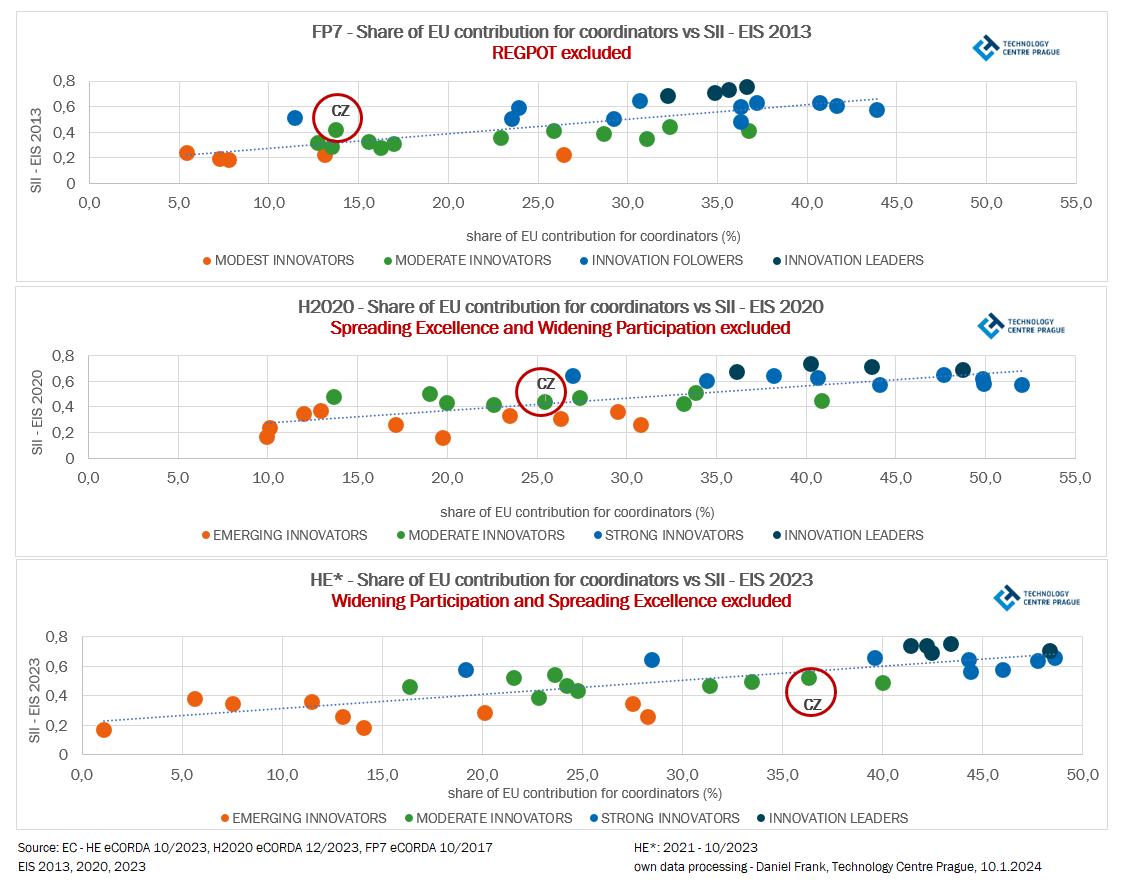
Figure 2b - Relationship between the Summary Innovation Index and the share of financial contribution for coordinators from selected European countries divided according to their innovation performance in the three FPs - FP7, H2020 and HE priorities, excluding participation in REGPOT (FP7) and SEWP (H2020 and HE)
If we look at the structure of financial contribution of Czech coordinators according to the individual types of actions in the FPs, we can see some changes in this structure over time. It is evident that from FP7 to the HE programme, the share of financial contribution received by Czech coordinators who managed coordination and support actions is decreasing, and on the contrary, the share of financial contribution requested by Czech coordinators of projects with higher research and innovation ambitions (CP, RIA, IA projects) is increasing. Principal investigators of generously funded ERC grants receive high shares of financial contribution among all Czech coordinators. The shares of financial contribution for Czech coordinators in projects largely targeted at SMEs are also on an increasing trend. However, in this case, the positive upward trend in financial support is influenced to a large extent by the nature of the special project schemes for this type of entities - e.g. the SME instrument in the H2020 programme. The resulting ratios may also be influenced by incomplete data for EIC grants in the HE programme. The financial shares for coordinators of individual research mobility projects - MSCA - IF (PF) have a downward trend. See Table 3 for details.
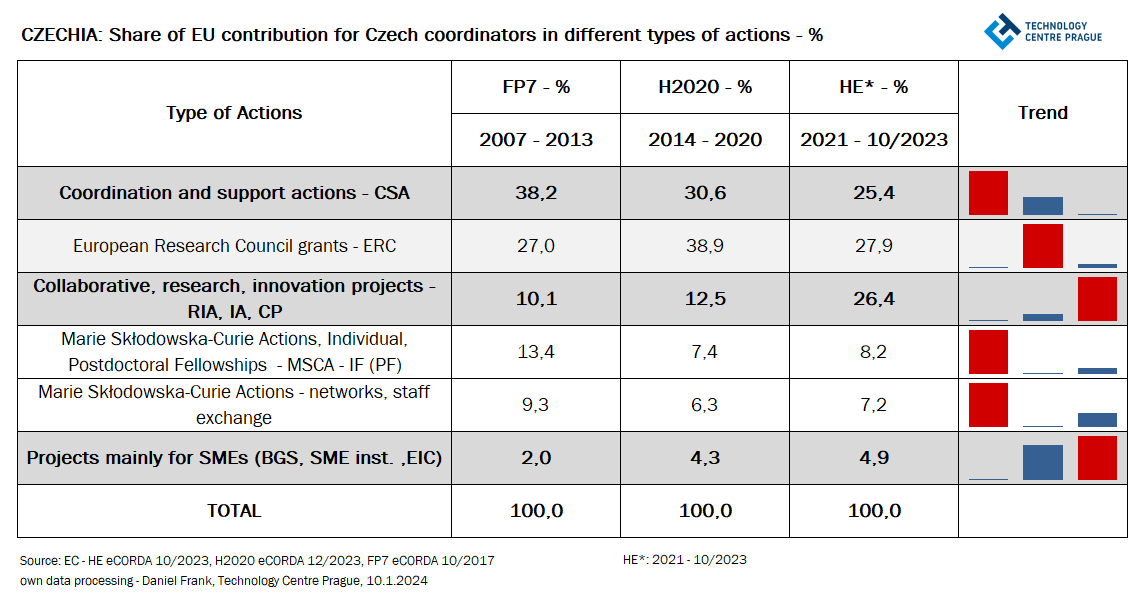
Table 3: Share of financial contribution for coordinators from the Czech Republic in individual project types in three consecutive FPs - FP7, H2020 and HE
Table 4 shows the large differences between the selected Visiting Countries in the share of funding for HE project coordinators. The shares of financial support for project coordinators from Visiting Countries range from about 10% to more than 43%. It is clear from the table that among the Visiting Countries listed, coordinators from the Czech Republic contribute the largest share of the overall national financial balance in the HE programme, with their claimed support amounting to more than 43% of the total financial contribution to the Czech Republic. This share of financial support for the Czech coordinators is fully comparable to the aggregate share of financial support achieved by coordinators from countries with strong research and innovation potential. At the opposite pole of the ranking of countries we find Ukraine, which receives only less than 10% of its requested contribution from the HE programme budget from project coordination. The total share of financial contribution for coordinators is divided in the table into different types of projects. A specific part of the financial contribution for coordinators of the specific priority Widening Participation and Spreading Excellence (SEWP) is specifically highlighted here, where only widening countries are allowed to coordinate individual or consortium projects. It appears that for most of these widening countries, the share of funding received for the coordination of SEWP priority projects represents a significant part of their total requested contribution to coordinators - see third column of the table. For some widening countries, SEWP projects are even the main and decisive source of funds received for project coordination. These are, for example, Ukraine, Serbia and Slovakia. For these countries, more than 2/3 of the funding for project coordination comes from this priority. The Czech Republic and Portugal differ from most of the other widening countries in the much higher share of funding they receive for the coordination of RIA and IA projects as well as for the coordination of individual ERC grants. This brings them closer to the countries classified by the EIS as strong innovators or innovation leaders. Greece and Latvia also have a higher share of funding from the coordination of RIA and IA projects compared to the other widening countries, but these two countries have a low share of funding from the coordination of ERC projects. Slovenia and Hungary have a higher share of ERC project coordination funding, but these two countries do not coordinate many RIA and IA projects, unlike the Czech Republic and Portugal.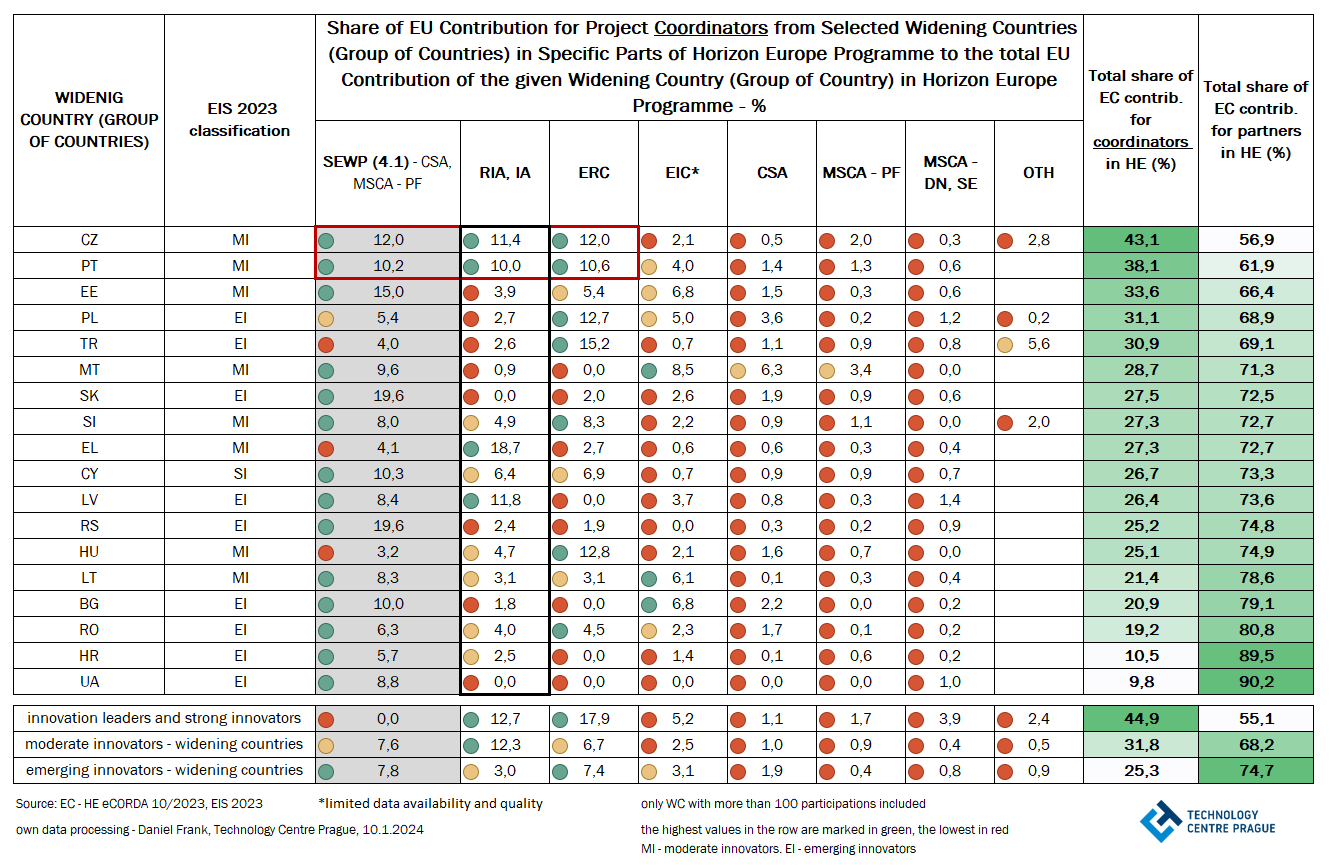
Table 4: Share of EU financial contribution for coordinators from selected widening countries in specific parts of the HE programme (in each project type) to the total financial contribution for selected widening countries in the HE programme
The analysis indicates that the significance of project coordination for the participation of the Czech Republic in the FPs is increasing. Coordinators from the Czech Republic contribute significantly to the overall financial balance of the Czech Republic in the HE programme. While in FP7 Czech research teams and individual researchers participated in FP projects rather as members of research consortia or as coordinators of individually oriented projects, the end of the H2020 programme and especially the current situation of the HE programme show that the situation is gradually changing and Czech research institutions are also becoming more involved in leading larger consortium projects.
Czech research teams and individuals are increasingly becoming leaders in HE projects. In particular, the share of financial contribution required by Czech coordinators from projects with higher research and innovation ambitions (RIA, IA projects) is increasing. While in FP7 Czech institutions coordinated only 10 collaborative CP projects (the fore-runner of the RIA/IA project type), in the whole H2020 programme 21 RIA and IA projects, in the first third the Czech Republic coordinates already 22 RIA/IA projects. In FP7, 11 ERC grants have been awarded to principal investigators in the Czech Republic, 38 ERC grants in the H2020 programme, and 31 ERC grants in the 2021-2023 HE programme. The Czech Republic performs standard well in the HE programme in the SEWP priority aimed at participation of widening participation countries.
It would therefore appear that the satisfactory use of the possibilities for coordination of projects aimed at reducing the persistent gaps in research and innovation performance (widening projects), the relative success in gaining ERC grants, and the higher success in coordinating larger-scale research and innovation projects (RIA and IA projects) are the key factors that distinguish the Czech Republic from most other widening countries in the HE programme, and, on the contrary, bring it closer to countries with higher research and innovation potential.
The project coordination is becoming a key aspect of the Czech participation in the FPs. The question remains whether this is really the beginning of a new and permanent trend in the thinking and perception of the FPs as an ideal tool to promote own research and ideas, supported by improving management and coordination capacities and skills in research institutions and the development of consultancy and stimulation tools for project coordinators, or whether it is just a combination of extremely positive circumstances (one such circumstance could have been e.g. the administrative and political impossibility for the UK and Switzerland to lead the HE programme projects or the resignation of other widening countrie to coordinate international projects) and the immeasurable efforts of extremely agile individuals and research teams.
The first option is supported by the gained experience of project coordinators from previous FPs, improved connections to domestic and foreign consultancy firms, assistance vouchers for the preparation of project proposals, consultancy services of TC Prague including the evaluation of project proposals out-of-the-box or pre-screening of project proposals, workshops of the national expert group for ERC applicants including the well developed system of mock interviews in the preparation of ERC grants and, last but not least, the gradual breaking down of myths about the inaccessibility and complexity of FP projects.
Although the proportion of coordinated FP projects in the Czech Republic is gradually approaching that of developed EU countries, there is still a need for more FP projects led by Czech institutions and individuals. Although the Czech Republic is gradually reducing its deficit from previous FPs in the number of coordinators in relation to its research capacity, it is still lagging behind the developed EU countries and some of the widening countries. There is no doubt that the coordination of FP projects offers considerable potential for a more successful future of the Czech Republic in the FP. The higher the number of the FP projects under the leadership of Czech coordinators, the higher the participation of the Czech Republic in the FP. The calling for increased participation of the Czech Republic in the FP should therefore not be abandoned. In the Czech Republic, we should not completely stop mass events for new applicants for participation in the FP, but at the same time it is necessary that the activities of all responsible actors in the Czech research area should be targeted and intensively directed towards supporting really perspective individuals and research teams.
Author: Daniel Frank, TC Prague, frank@tc.cz, Prague, January 28, 2024
27/01/2026
22/12/2025
02/12/2025